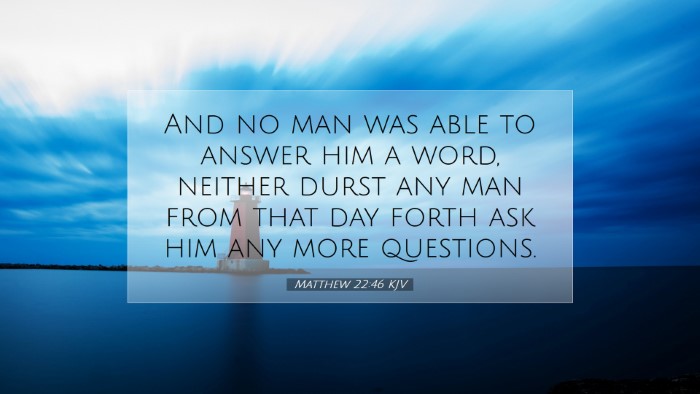Commentary on Matthew 22:46
Matthew 22:46: "And no man was able to answer him a word, neither durst any man from that day forth ask him any more questions."
Introduction
This verse captures a profound moment in the ministry of Jesus, where His authority and wisdom leave His challengers speechless. This encounter illustrates the culmination of a series of questions posed to Him by the Pharisees and Sadducees, aimed at entangling Him in doctrinal disputes and political dilemmas. The response (or lack thereof) from His adversaries not only underscores Jesus' messianic authority but also serves as a vital lesson for contemporary readers about the nature of divine wisdom versus human understanding.
Contextual Background
The previous verses, leading up to Matthew 22:46, expose the intent behind the Pharisees' examination of Jesus. They aim to challenge His teachings and authority. However, Jesus, armed with divine insight, answers each question with masterful precision. The sequence of questions serves to display Christ's understanding and the limitations of earthly wisdom as He engages with the religious leaders.
Commentary Insights
-
Matthew Henry’s Commentary
Henry highlights the silencing of His opponents as indicative of Christ’s divine wisdom. He notes that the inability of the Pharisees to answer Him reflects their spiritual bankruptcy; their reliance on tradition blinded them from recognizing the divine truth spoken directly to them. Henry emphasizes that this divine authority was often met with opposition, yet Jesus’ ultimate triumph in silencing His foes points to His divine nature and mission.
-
Albert Barnes’ Commentary
Barnes provides a more analytical approach, stressing the embarrassment caused by Jesus’ questions. He posits that the Pharisees were caught in their own theological traps. Barnes draws attention to the fact that the silence of the leaders was a significant moment that marked a turning point in their confrontational approach to Jesus. They realized that their inquiries were futile against such wisdom and that any further questioning would only serve to expose their ignorance.
-
Adam Clarke’s Commentary
Clarke delves into the implications of Jesus' statement that no man dared ask Him further questions. He interprets this as an acknowledgment of the supremacy of Christ's knowledge and his role as the ultimate teacher. Clarke suggests that this moment serves to establish a precedent for the authority of Christ in matters of faith and life. Additionally, he points out how this passage foreshadows the growing separation between Jesus and the religious establishment of His day.
Theological Implications
The response, or lack thereof, from the religious leaders also resonates with the theme of revelation. In Christ, the fullness of God’s wisdom is revealed – a wisdom that surpasses human understanding. This moment can encourage pastors, students, and theologians to reflect on the nature of divine wisdom as it contrasts with human folly. It implores scholars to recognize that there are divine truths that may defy human logic, yet are essential for faith.
Application for Modern Readers
No less than the leaders of His day, modern believers are often faced with questions of faith that challenge their understanding. For pastors and theologians, this commentary on Matthew 22:46 serves as a reminder that God's wisdom often lies beyond simple human rationale. The silence of the religious leaders acts as a call to humility; understanding that knowledge apart from God is limited and often leads to confusion.
This can inspire a deeper devotion to seeking God through prayer and study of the Word, recognizing that true answers come not merely from a wealth of information but through relational engagement with the divine. It also encourages cautiousness in approaching faith as a series of proofs and doctrines instead of a living relationship with Christ.
Conclusion
Matthew 22:46 not only encapsulates a significant moment in Christ's ministry but also serves as a key teaching point regarding the nature of divine authority and wisdom. The silence of the Pharisees stands as a testament to the unmatched depth of Jesus’ understanding. In this post-modern age, where questions abound, it is vital for believers to lean into the silence created by the majesty of God, echoing the sentiment that our God is not merely an answerer of questions, but the very essence of wisdom itself.


